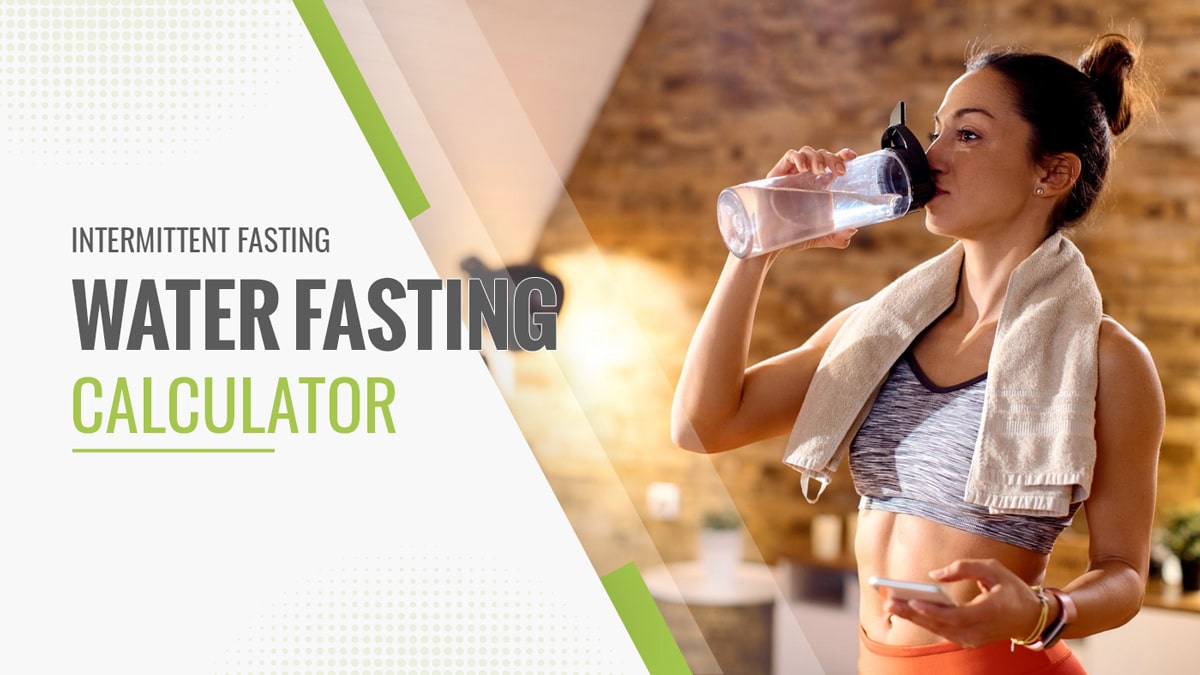Water Fasting Weight Loss Calculator
Results:
Approximate Weight Loss: calculated
Approximate New Weight: calculated
Fasting diets are very popular at the moment. That’s probably because they’re such a simple concept. Basically, a fast is a period during which you either don’t eat or eat a very limited number of foods. Some fasts are short and designed to be done frequently, while others are longer and done much less often.
Popular fasting diets include:
- One Meal A Day (OMAD) Diet
- The 5:2 Diet
- The 16:8 Diet
- Intermittent Fasting Diet
- Eat, Stop, Eat Diet
- Alternate Day Diet
- 24-Hour Fasting Diet
Of all the protocols, water fasting is arguably the strictest and the hardest to stick to. However, it’s also the one with which you’ll probably lose the most weight. With a water fast, you consume only water for the duration of your fast. No coffee, no juice, no tea, and no solids – just water.
See, we told you fasting was simple!
But how much weight can you expect to lose during a water fast? The answer depends on the length of your fast, your starting weight, and your gender. Use our water fasting calculator to estimate how much weight you will lose during your next water fast.
What is the Water Fasting Weight Loss Calculator?
The water fasting calculator is designed to estimate how much weight you will lose during a water-only fast. During a water fast, you consume no food and only drink water. Most people should aim to consume 2-3 liters of water per day, but there is no upper limit for water consumption, and, up to a point, more is better.
To calculate weight loss, the water fasting calculator takes into account your current weight, your gender, and the duration of your fast. It then estimates how much weight you are likely to have lost by the end of your water-only fast.
This is useful for predicting weight loss, and the result can also be motivating as you’ll be able to see how much weight you can lose within a few short days.
How Does the Water Fasting Weight Loss Calculator Work?
Water contains no calories. If you consume nothing but water, your body will quickly begin breaking down and burning fat to get the energy it needs, and your weight will plummet.
Your weight, gender, and activity levels determine how many calories you need per day, known as your Total Daily Energy Expenditure or TDEE for short. By estimating your TDEE, the calculator can determine how much weight you should lose per day during a water fast.
It is generally accepted that a pound of fat contains 3,500 calories. Therefore, if it takes an average of 2,500 calories to maintain your current weight but you don’t consume any food, you can expect to lose around ¾ a pound per day on a water fast. Multiply that number by the length of your water fast, and you can predict how much total weight you’ll lose.
Research suggests that men lose weight faster than women during a water fast, and the heavier you are, the more quickly you’ll lose weight (1).
This is because men and larger bodies in general require more energy to sustain their weight. Consuming nothing but water creates a larger calorie deficit for these groups, hence the more significant weight loss.
Body size and gender are taken into account by the water fast weight loss calculator.
How to Use the Water Fasting Weight Loss Calculator
Our water fast calculator is very straightforward to use. Just follow these step-by-step instructions to estimate how much weight you’ll lose during your next water fast.
- Select your gender, choosing between male and female.
- Specify the length of your water fast.
- Choose your units – metric (kilograms) or imperial (pounds).
- Enter your starting (current) weight.
- Hit “Calculate”
- Read off your results in the box below.
Interpreting your Results
After inputting your gender, length of fast, current weight, and hitting enter, you’ll get two results or stats:
- Approximate weight loss – this is the amount of weight in pounds or kilos you can expect to lose by the end of your water fast.
- Approximate new weight – this is an estimate of what you will weigh at the end of your water fast. It’s your current weight minus the expected weight loss.
It’s important to note that these results are estimates only, and actual weight loss can vary depending on things like activity levels, age, metabolic rate, stress levels, and genetics.
How to Maximize Weight Loss
Use the following strategies to ensure you lose as much weight as possible during your water fast.
Do not break your fast!
Fasting means going without food, and a water fast means the only thing you can consume is plain water. Tea, coffee, soda, and juices are OFF the menu! Breaking your fast with snacks or beverages other than water will affect your results and reduce weight loss.
Drink lots of water
Drinking plenty of water will ensure that you remain hydrated, feel less hungry, and lose weight faster. When you consume a lot of water, your body responds by excreting more. You’ll probably pee more than you drink on a water fast.
Water is heavy stuff, weighing one kilogram or 2.2 pounds per liter. The more water you drink, the more you’ll excrete and the more weight you’ll lose.
Stay active
While you may not feel like exercising during a water fast, you should avoid being sedentary. The more you move your body, the more calories you’ll need and the more fat you’ll burn. In short, move more to lose weight faster.
Even a few short walks per day will help you lose weight faster.
Get plenty of sleep
Sleep deprivation can make it harder to lose weight. Improve your water fast results by getting 7-9 hours of sleep per night. This may mean you have to go to bed earlier, but getting more sleep can have a significant impact on weight loss. It’ll give you more energy, too.
Avoid stress
Stress causes your body to release a hormone called cortisol. Cortisol limits fat burning and promotes fat storage, which is the opposite of what you want during a water fast. Try to avoid stress to maximize your weight loss results.
Good options for reducing stress include:
- Better time management
- Learning to prioritize
- Breathing and mediation
- Spending time in nature
- Avoiding stressful situations and people
- Getting plenty of sleep
- Delegating when possible
- Not taking on more work than you can handle
- Learning how to say no
- Learning to unplug from technology – especially an hour or so before bedtime
Water Fasting Weight Loss Calculator FAQ
1. How accurate is the water fasting calculator?
Like all such calculators, this tool provides an estimate based on things like weight and gender. However, your actual daily caloric expenditure depends on activity levels, age, stress, and sleep, none of which are taken into account on this calculator.
As such, this water fasting calculator is pretty accurate, but it cannot be said to be 100% precise. As a result, your actual weight loss could be more or less than what is estimated.
2. Are water fasts safe?
Water fasts are mostly safe, but there are still a few risks to consider. These include:
- Mineral imbalances
- Hunger
- Headaches
- Nausea
- Impaired kidney function
- Foul taste in the mouth
- Bad breath
- Insomnia
- Fatigue and weakness
These symptoms tend to be worse at the start of a water fast and diminish after a couple of days. They also tend to be less severe during subsequent water fasts. Short water fasts are less impactful than longer fasts.
However, the biggest risk associated with water fasting is not the result of fasting but when you start eating again. This is called refeeding syndrome and is especially true for anyone who fasts for over five days or more.
Refeeding syndrome is a potentially fatal condition caused by eating too much food after a lengthy fast. Symptoms of refeeding syndrome include:
- Weakness
- Confusion
- Difficulty breathing
- High blood pressure
- Abdominal pain
- Seizures
- Heart failure
- Coma
- Death
To avoid refeeding syndrome, you should break your fast with a small, light meal and avoid binging. Fresh fruit, vegetable soups, and natural yogurt are all good choices. Subsequent meals should also be light and easy to digest. Take several days to gradually return to eating normally.
3. Will I regain weight after a water fast?
In all likelihood, you WILL regain some weight when you end your water fast and return to eating normally. That’s because, during your fast, you lost fat but also some muscle and a substance called glycogen. Glycogen is glucose stored in your liver and muscles.
Glycogen is chemically bound to water, so as your glycogen levels return to normal, you’ll also store more water. When you break your fast, glycogen levels are replenished, leading to rapid weight regain.
However, providing you break your water fast with small meals and don’t eat to excess, you should not regain fat after water fasting.
4. How long should I water fast for?
While you could do an extreme water fast for seven days or more, it’s generally best to stick to two to five days. This is physically and mentally achievable for most people. You can try a longer fast once you’ve determined that water fasts work for you.
However, if you are entirely new to fasting, start with a 24-hour water fast to see how your body responds. If you are successful, feel free to try again for a longer duration.
5. How often can I do a water fast?
As a general rule, the longer you do a water fast, the less often you should do it. For example, you could do a two-day water fast once a month or a one-week water fast every six months. However, fasting more often than this could be harmful, causing eating disorders and other long-term health issues.
However, there are other fasting protocols that are better suited to more frequent use, such as OMAD, 16:8, and the 5:2 diet.
6. What are some of the benefits of fasting?
People have been fasting for centuries, and the proposed benefits include:
- Weight loss
- Fat loss
- Detoxification
- Lower blood pressure
- Lower blood glucose
- Improved blood lipid profile
- Increased immunity
- Cell renewal
- Improved cognition
- Increased longevity
- Reconnection with appetite
Life extensionists believe fasting is the key to living longer and more healthily. During a fast, your body has the time and energy to focus on getting rid of dead cells and replacing them with new ones. This process is called autophagy.
Autophagy is thought to be critical for life-long health, including protection from cancer, heart disease, Alzheimer’s disease, and life-threatening medical conditions. Many of the world’s longest living populations fast regularly.
Other related calculators:
- TDEE Calculator
- Calorie Deficit Calculator
- Carb Cycling Calculator
- Calories Per Meal Calculator
- Intermittent Fasting Calculator
- Water Fasting Weight Loss Calculator
- Weight Gain Calculator
Wrapping Up
Water fasting is a quick and effective way to lose weight, and you can expect to drop around a pound per day during a water fast.
However, water fasting is also challenging, and many people will find it too restrictive for anything other than short and occasional use.
Water fasting is generally safe, but some people experience side effects, including severe hunger, headaches, nausea, and fatigue. It’s also crucial to break your fast with small meals to avoid potentially life-threatening refeeding syndrome.
Use our water fasting calculator to estimate how much weight you can lose during a water fast.
Reference:
1– British Medical Journal: Energy Provision, Tissue Utilization, and Weight Loss in Prolonged Starvation
Tip: If you're signed in to Google, tap Follow.












Absolutely obsessed with this calculator. Super super accurate results. Literally super accurate. I just know my next weight cause of this app